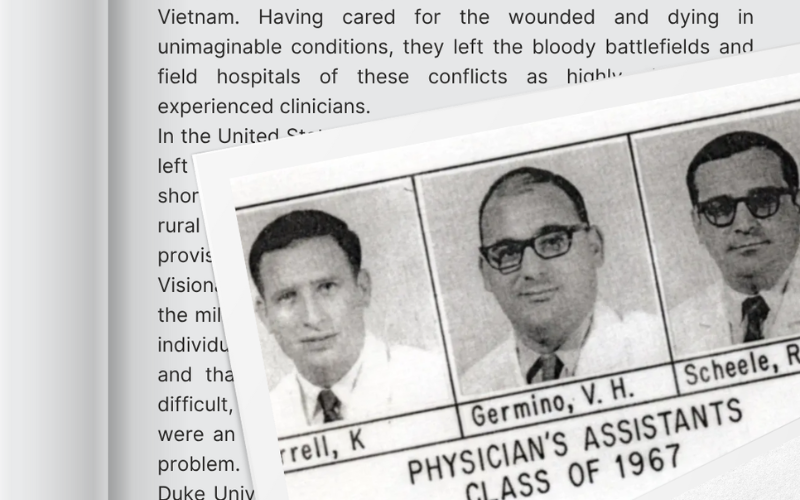Happy PA Week to every Physician Associate across the globe! This week is more than a celebration, it’s the public recognition of a profession that exemplifies the concept of teamwork and collaboration.
In recent years, PAs across the world stood shoulder to shoulder with their healthcare colleagues as they bravely battled the global pandemic, risking their own lives and wellbeing for their patients.
But their sacrifice will come as no surprise to those who know the history of the PA profession.
The role was born out of the courage and fortitude of the military medics and corpsmen who served in WWII, Korea, and Vietnam. Having cared for the wounded and dying in unimaginable conditions, they left the bloody battlefields and field hospitals of these conflicts as highly skilled and experienced clinicians.
In the United States in the 1960s, a shortage of physicians had left many communities without access to healthcare. This shortage particularly impacted on already underserved, poorer, rural communities, who struggled to access even basic medical provision.
Visionary leaders like Dr. Eugene A. Stead Jr. saw potential in the military medics returning from service. He knew that these individuals were already trained to assess and treat patients, and that they were experienced in providing leadership in difficult, under-resourced environments. To Dr. Stead, they were an untapped resource, and the potential solution to the problem. From that innovative spark, the first PA program at Duke University was born in 1965, and a new kind of clinician emerged: adaptable, capable, and focused on patient needs above all else – the Physician Assistant.
Fast forward to today, and PAs, now largely referred to as Physician Associates, have become a vital part of healthcare systems in countries around the world. Today, PAs or Associate professionals care for patients in a wide variety of countries, from the U.S. and Canada, to Israel, Ireland, the Netherlands, New Zealand, Germany, India, and of course, here in the United Kingdom.
In the UK today, the PA profession continues to grow and develop. From the early PA pioneers over two decades ago, to the new cohorts of students entering university programmes, PAs are now found across primary and secondary care in a variety of specialties and clinical environments. Patients benefit from shorter wait times, increased access to care, familiar faces embedded in healthcare teams, and clinicians who come from a variety of social and ethnic backgrounds, thereby reflecting – and understanding – their diverse patient populations.
If you’re a qualified PA, thank you for your unwavering dedication to your patients and your profession! Every day, you make a difference, and the vital contribution you make to the healthcare team does not go unnoticed.
If you’re a PA student, you are stepping into a legacy of innovation and service. Take pride in your role and show diligence in your studies and know that every PA is here to support and inspire you to be the best clinician you can be.
And, if you’re one of the pioneers who helped establish this profession either within the United States or around the world, know that you have changed the course of global healthcare for the better.
From its origins on the battlefields of Korea and Vietnam and the rural, underserved communities of the US, to the front lines of modern global medicine, the PA profession proves one truth time and time again:
When skilled, compassionate clinicians are empowered to contribute to healthcare systems, lives are saved, health outcomes improves, and communities heal.
So, here’s to every PA and PA student. This week is for you – and the world is a better place because you are in it.
Happy 60th Anniversary to the PA Profession! Here’s to the next 60 years.
(Photo credit: Duke University Medical Center Archives)



